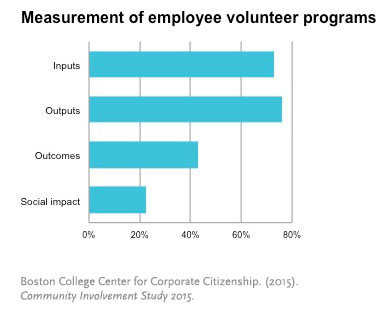 Corporate citizenship professionals are becoming increasingly adept at tying CSR programs to overall business strategy, creating programs that make the most of their employees’ unique skills and their companies’ products and services, and tackling the problems that are most relevant to their stakeholders and operating contexts. In this way, they are addressing environmental, social, and governance issues while contributing to important business goals. To ensure that they are efficiently investing their time, skills, and financial resources, effective CSR professionals are relying on careful measurement and evaluation tactics.
Corporate citizenship professionals are becoming increasingly adept at tying CSR programs to overall business strategy, creating programs that make the most of their employees’ unique skills and their companies’ products and services, and tackling the problems that are most relevant to their stakeholders and operating contexts. In this way, they are addressing environmental, social, and governance issues while contributing to important business goals. To ensure that they are efficiently investing their time, skills, and financial resources, effective CSR professionals are relying on careful measurement and evaluation tactics.
Measurement and evaluation provides a systematic method to identify, collect, and analyze the pertinent data that are applicable for performance improvement. Companies that make use of it as part of their formal corporate citizenship efforts not only better their programs, but also achieve better long-term financial performance. According to a 2014 study, firms that created formal corporate citizenship programs that included targets, measures, and consequences financially outperformed companies that did not over the long term.[i]
These CSR and business benefits are driving CSR professionals to measure, but are they measuring the right things? The Boston College Center for Corporate Citizenship’s soon to be released 2015 Community Involvement Study finds that 87 percent of companies surveyed measure their volunteer programs at some level, but only 23 percent measure the social impact of these programs (see below). Social impact measurements offer companies the data to support long-term investments, and those that measure this factor now may be gaining a competitive advantage.
The Study finds similar data for corporate giving programs, with 80 percent using some form of measurement for their investments, but only 13 percent of companies measuring the social impact of their corporate giving programs. As these findings illustrate, the vast majority of companies measure their programs, but a much smaller percentage assess the value their citizenship efforts deliver to the community.
Two Center members—Allstate Insurance Company and Booz Allen Hamilton—serve as compelling examples of how measuring corporate citizenship can help companies achieve business and social value. The Center’s November webinar, titled Impact and Measurement: How to Measure Progress, featured representatives from both companies who shared insights, best practices, and lessons learned from evaluating their programs—and demonstrated how using data improved their efforts.
- Allstate determines the success of their citizenship programs though a measurement framework and leverages this framework to understand which corporate citizenship efforts their internal and external stakeholders regard as important, such as teen safe driving and domestic violence. For example, Allstate’s partnership with the National Safety Council has helped reduce teen traffic fatalities by 50 percent.
- Booz Allen Hamilton measures the impact of their environmental sustainability programs, which focus on company-led sustainability initiatives, community partnerships, and client work. For instance, Booz Allen Hamilton reduced their environmental impact by 304 tons of wood per year by purchasing 30-percent recycled rather than non-recycled paper and decreased their electrical consumption by 585,000 kilowatts in their office buildings.
[i] Eccles, R.G., Ioannou, I., & Serafeim, G. (2014). The Impact of Corporate Sustainability on Organizational Processes and Performance. Management Science: 60 (11), 2835-2857.
Subscribe to the Boston College Center for Corporate Citizenship's Blog
Get the latest business perspectives on corporate citizenship straight to your inbox.